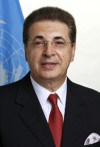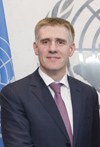Question 3
"As representatives of the people, parliamentarians want to ensure a more democratic selection process for the UN Secretary-General. What role do you think parliamentarians, through the IPU, the world organization of parliaments, play in this process?"
QUESTION 1 - QUESTION 2 - QUESTION 3
Ms. Irina Bokova, Bulgaria
![Ms. Irina Bokova [Bulgaria]](un-Q1_clip_image001.jpg) |
The partnership with parliamentarians is vital to enhance the transparency, the visibility and the inclusiveness of the UNSG selection process. IPU has a unique role to play in ensuring that the voice of ordinary citizens is being heard throughout the selection process as the United Nations was created to serve people. And I commend the efforts of IPU of holding discussions on this issue as I see them as a milestone in our endeavours of building a stable long-term relationship between IPU and the UN. |
Ms. Helen Clark, New Zealand
![Ms. Helen Clark [New Zealand]](un-Q1_clip_image001_0000.jpg) |
Parliamentarians can help raise public awareness of the selection process for the post of UN Secretary-General. They can consider what skills are required for the post and assess the attributes of candidates against those skill sets. Some parliamentarians will wish to raise the issue for discussion in their parliaments. This is all helpful to a more transparent process. |
Ms. Natalia Gherman, Republic of Moldova
![Ms Natalia Gherman [Moldova]](un-Q1_clip_image001.png) |
The National Parliaments should encourage the Governments to advocate in favor of a transparent and inclusive selection process of the UN Secretary-General. Only through the input of the Parliaments, the voice of the people will be heard and therefore legitimacy of the selection process ensured. We would support a broader application of existing best practices, when Governments share information and coordinate with their Parliaments on the matter of UN affairs, including the selection of the Secretary-General. |
Mr. António Guterres, Portugal
![Mr. António Guterres [Portugal]](un-Q1_clip_image001_0001.jpg) |
I welcomed the letter by the UNGA and SC Presidents of 15 December which set in motion a new, more transparent and inclusive process of selecting and appointing the next UN Secretary-General. I believe Parliamentarians can play a role in raising awareness of the crucial importance of the United Nations in the world today, in public interest in the ongoing process of selecting the Secretary-General and, in this regard, offering through their organizations, the opportunities for Parliamentarians to interact with candidates and share their views in a parliamentary context. |
Mr. Vuk Jeremić, Serbia
![Mr. Vuk Jeremić [Serbia]](un-Q1_clip_image001_0002.jpg) |
Parliamentarians are essential in ensuring that their constituents’ thoughts and concerns are heard at the national and international levels. The IPU should not hesitate in sharing these thoughts and concerns with the candidates for UNSG. Additionally, I would welcome participating in a candidate debate hosted by the IPU or regional debates hosted by the parliaments of regional multilateral organizations to address issues affecting those regions. |
Dr. Srgjan Kerim, Former Yugoslav Republic of Macedonia
 |
We are all aware that the United Nations is an intergovernmental organization whose activities and functioning are based on the UN Charter. This also applies when it comes to the role of the Secretary General (Chapter XV, Article 97). Transparency as well as regional rotation and gender equality are important dimensions of the selection process. As far as the role of the IPU is concerned, as a candidate I have visited many Member States in various regions and have consulted, exchanged views, and addressed parliaments and parliamentarians regarding my program. |
Mr. Miroslav Lajčák, Slovakia
 |
There are mechanisms that govern the selection process – above all the UN Charter. Main UN bodies have their clear responsibility. Having said that, I believe parliamentarians may play an active part in several ways – to be engaged in discussions about further improvements, transparency and inclusivity of the processes, to create awareness vis-à-vis citizens of respective countries about the role and tasks of the United Nations, thus contributing to accountability of its work, including the process of the UN SG selection. |
Dr. Igor Lukšić, Montenegro
 |
Parliamentarians should seek to ensure more active role in the selection process. As representatives of people, they have much to offer, particularly regarding expectations and needs of ordinary global citizens from the leader of the World Organization. UN has to be responsive to the interests of population it serves. Therefore, parliamentarians’ voice carries significant weight and as such deserves appropriate space in the process, for the benefit of finding the best candidate for people worldwide. |
Ms. Vesna Pusić, Croatia
 |
The new process of selecting and appointing the UN Secretary General is a work in progress and will be developed and tailored further in the future. The growing role of the IPU within the United Nations can also be reflected in this election process. Parliaments can and should take part in defining the standards, for example in qualifications required from the candidates, the election activities, debates, hearings, scrutiny etc. |
Dr. Danilo Türk, Slovenia
![Dr. Danilo Türk [Slovenia]](un-Q1_clip_image001_0006.jpg) |
The most effective way would be through the IPU. I suggest that IPU, based on its previous discussions and its experience in work with the UN meet separately with each candidate for the UN Secratary-General, engage with them in a thorough discussion and at the end publish a summary of these meetings. The IPU may also wish to make recommendations with regard to the tasks of the future Secretary-General of the United Nations. |
QUESTION 1 - QUESTION 2 - QUESTION 3
